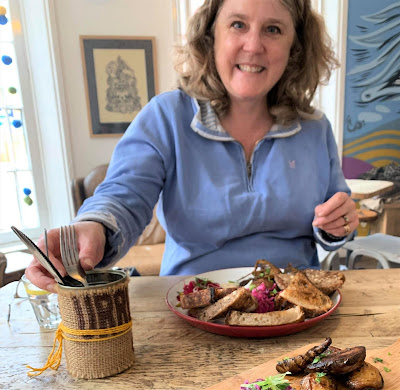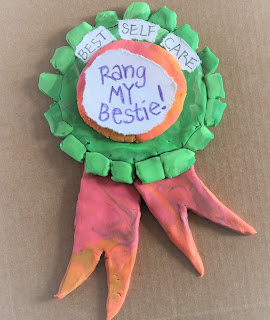 |
| Jill Dibling in 2017 with her artwork |
Derek Turner writes:
It was with a deep sense of sadness that I learnt recently that Jill had been diagnosed with terminal cancer. Three days ago, I learnt that she had passed away. My sense of sadness deepened with the fact that I would be unable to celebrate Jill’s life at The Pales Meeting House in Llandegley on Saturday 14th December 2019. It was typical of Jill that she did not want visitors, she would manage her illness, and her final days, in her own way with the support of ‘her girls’.
Jill was a pioneer in modern thinking about mental health. She not only had her own lived experience but she had ‘lived expertise’ as well. By lived expertise I mean that she learnt valuable skills from her own overcoming of the challenges she faced. It was her ability to use this expertise to the benefit of other people that makes her stand out.
Jill helped in the founding of Mid Powys Mind and later became Chair. She was equally involved in Powys Mental Health Alliance. It was in this later participation that I had most to do with Jill. The Alliance was run entirely by people with lived experience but it was Jill who was behind the radical approach to service provision that drew on her own expertise. Jill had a quiet tenacity that more often than not won the day when others might be sceptical about what could be achieved by people who were so often dismissed as mere ‘service users’.
It would however be wrong to remember Jill just in terms of mental health services. She was a committed artist whose work has been described as experimental. She passionately believed in the benefits for some people in the creative value of art in mental health and wellbeing. Jill would sing with the Peace Choir at the Pales Meeting House, but, if asked, Jill would probably see her role as a mother to her girls as her most important contribution.
There was a positive energy from Jill that gave us all hope. She will be missed in by all those who knew her, and her contribution to mental health services in Llandrindod, Powys and Wales, should not be forgotten.
Freda Lacey writes:
Jill was always someone who was open to developing and growing her knowledge. She was very involved in the lottery-funded DIY Futures project and was a firm proponent of the abilities of people to be very much co-creators of their own mental health care and treating people as experts in their own care.
I knew Jill in the capacity of my working with her in Participation, her patience and care of working with others and her openness to listening to other people’s views and her encouragement of people speaking up and asking for what they wanted. She was always supportive of me and I felt her deep care… She’d always have time for a coffee and would, in my early days, offer me guidance or knowledge of a situation or history/story that was invariably really important and valuable to know.
Jill undertook some Open University courses that I supported her on and certainly our discussions about her essays and her dedicated focus on learning inspired me, she was always wanting to improve her knowledge and continue to grow and learn.
Jill was a skilled professional volunteer contributing outstanding knowledge and guidance to mental health services in Powys, particularly her support of individuals coming together as peers. She was recently awarded a life achievement award by Mid Powys Mind which was very well deserved.
 |
| Jill (right) with Pat Atkinson of Powys Mental Health Alliance in 2009 |
There was a positive energy from Jill that gave us all hope. She will be missed in by all those who knew her, and her contribution to mental health services in Llandrindod, Powys and Wales, should not be forgotten.
 |
| Jill (far right) at the launch of the Powys "Yellow Book" of mental health information in 2000 |
Jill was always someone who was open to developing and growing her knowledge. She was very involved in the lottery-funded DIY Futures project and was a firm proponent of the abilities of people to be very much co-creators of their own mental health care and treating people as experts in their own care.
I knew Jill in the capacity of my working with her in Participation, her patience and care of working with others and her openness to listening to other people’s views and her encouragement of people speaking up and asking for what they wanted. She was always supportive of me and I felt her deep care… She’d always have time for a coffee and would, in my early days, offer me guidance or knowledge of a situation or history/story that was invariably really important and valuable to know.
 |
| Jill with colleagues from Powys Mental Health Alliance in 2010 |
Jill was a skilled professional volunteer contributing outstanding knowledge and guidance to mental health services in Powys, particularly her support of individuals coming together as peers. She was recently awarded a life achievement award by Mid Powys Mind which was very well deserved.
I will miss her, her quiet support and the way she would invite sharing. I will miss her steadfastness and extraordinary lived experience, her gentleness and yet her solid convictions on what was right and what was needed. Her loss in respect of mental health services in Mid Powys will be keenly felt.
Letting go – a poem by Jill Dibling
 |
| Jill at the grand opening of the Wellness & Recovery Learning Centre on Felindre Ward, Bronllys Hospital, in 2014. |
The creeper went west
With the wind from virginia.
The tall trees went south
With the wind from the north.
The gardens went wild as
The weeds became stronger -
They thrived and they seeded
And then they took hold
Of the lawns and the beds
Where the roses were growing.
Then all became clear as
Their strength was revealed.
The moss covered stones and
The fungi grew bold
On the wood of the roof and
The door and the sills.
The pools formed and swirled and
Spawned life of their own.
Then at last we let go of
The home that had bound us.
The breath of the earth and
The light could surround us
And free us to enter
That world that had found us.
Derek Turner worked for many years as a Mental Health Development Worker at Powys Association of Voluntary Organisations.
Freda Lacey is the Mental Health Partnership Manager, Powys Teaching Health Board, and previously the Senior Officer Health & Wellbeing at PAVO.
































